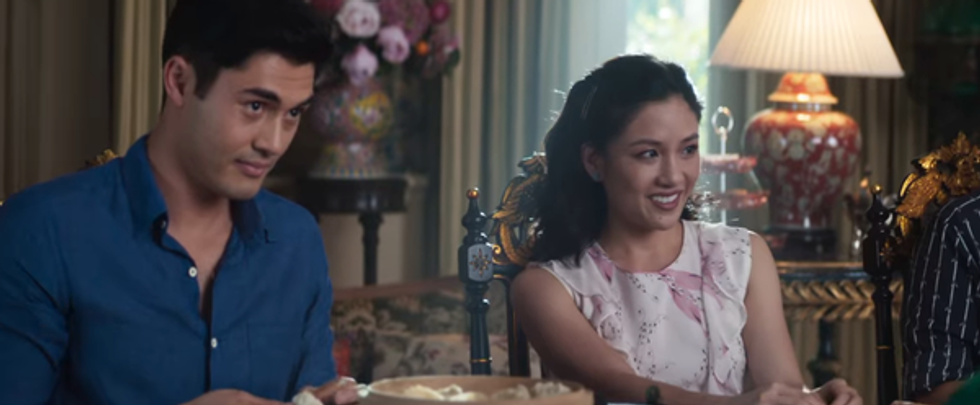When I first heard about "Crazy Rich Asians," I was excited at first- a new movie with an all-Asian cast! But not long after I started looking through discussions about it, I did find criticism of choosing to cast Henry Golding in the lead role of Nick Young, a young man from Singapore. He, like me, is half white and half Asian, and so hearing these things struck me. I'm sure plenty of people had plenty of reasons to complain, as they always do, but the one that was the most talked-about was how he "wasn't Asian enough."
Soon enough, I saw the movie with my family, and liked it, but didn't love it as much as I had hoped I might. I saw a lot of Asians reacting to the film positively, saying how nice it was to see people onscreen that looked like them and had the same customs as them. In comparison, I could barely relate. I felt like I had missed a revelation.
I talked to my mother the next day about it. She is the daughter of two Filipinos but was born in America years after their immigration here. She said she saw a lot of how she grew up in the movie, but knew she was slightly removed from it since she'd lived in a small Connecticut town thousands of miles from her parents' home country. She acknowledged that I had even less of that, which I can't deny. I grew up in a town with few Asians, miles away from any of my Asian relatives, and in a way that was very much American.
Hearing her say that made me feel a sort of tension inside though, which didn't surprise me much. Though I'm aware that my Asian heritage is more distant than I would like it to be, part of me clings to it a little more than the other part of me feels like I should. I identify myself as Filipina first before my Jewish/European heritage. I have wished for a long time that I was more invested in that side of my heritage. As a result, I always get a little put off when someone tells me how Asian I don't look. I usually glance at the mirror and see something close to my mom, but with my dad's skin color- a very pale Filipina. But others say I don't look that Asian, or it's ambiguous enough where they want to ask if I don't bring it up first.
Sometimes, my opinion of my whiteness goes so far as to frustrate me. There are small things, like how easily my pale skin gets sunburned and sticks out from my Filipino family members (several of whom are also half white, though nobody shares this trait with me except my sister), but there are larger things at work. I hate the privilege I have because I am white-passing. I see white privilege at work in others, who sometimes use it in terrible ways that usually attract more attention than the good ways. But should I be grateful to be somewhat in society's favor? To have this privilege, which gives me the power to make a change? Or am I too Asian to really receive it?
Whether I have it or not, I know that I don't want to associate with it. It's unfair that privilege exists at all, but I think it's also that I have always appreciated my unique traits more. When I do celebrate my European heritage, it's specifically pointing out my family's Jewish background- of which I'm not heavily involved in either. Somehow, though, it feels like less of a difficulty for me to identify with since it's a religion and not an ethnicity or a race prescribed through genetics.
But throughout thinking about this, I have come to realize this much: yes, half of my genes were inherited by people of one culture, and the other half from people of another, but that doesn't mean I am less entitled to them. Those halves are just genetics. They don't change who I am inside. Also being white doesn't mean that I am of less Asian descent. They aren't mutually exclusive. I have lots to learn about my background, but it will always be my background, and that's enough to start with. I want to explore it more, and I can. That's why it's called being "mixed"- you can't have half of a race. I have Philippine heritage and I have Jewish, European heritage. I am lucky enough to be a part of both communities. I don't feel totally resolved on how to feel about this internal conflict, but I know I have the right to embrace them. I might as well take advantage of it.





 Lumiere figure at the Disney Store at the Ala Moana Shoppi… | Flickr
Lumiere figure at the Disney Store at the Ala Moana Shoppi… | Flickr








 StableDiffusion
StableDiffusion StableDiffusion
StableDiffusion 10. Extra BlanketsJuwenin Home 100% Cotton Knitted Throw Blanket
10. Extra BlanketsJuwenin Home 100% Cotton Knitted Throw Blanket StableDiffusion
StableDiffusion StableDiffusion
StableDiffusion File:Kishlaru familie.jpg - Wikimedia Commons
File:Kishlaru familie.jpg - Wikimedia Commons Photo by Hanna Balan on Unsplash
Photo by Hanna Balan on Unsplash StableDiffusion
StableDiffusion black blue and yellow round illustrationPhoto by
black blue and yellow round illustrationPhoto by 





 woman holding glass jar
Photo by
woman holding glass jar
Photo by 








